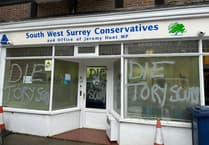“DOES this old picture show one of Woking’s carnivals?” asked reader Andy Doran, hoping the Peeps into the Past column could shed some light on the black and white image.
He emailed to say he is trying find more information about the photo that posted to a Facebook page devoted to unidentified photographs of the UK.
Andy says he thinks it shows Chertsey Road and may be from one of the Woking carnivals featured in Peeps previously, along with picture postcard views of the floats that took part in processions through the town.
The 1923 carnival was particularly big and successful. It raised more than £3,000 to help offset a balance of £6,000 to complete a £20,000 extension to Woking’s cottage hospital.
The photo looks like Chertsey Road to me, and for another opinion I emailed a copy of it to Richard and Rosemary Christophers, archivists at The Lightbox.
They said: “It is certainly Chertsey Road, and the A1 Boot Company [see the shop’s sign on its sunshade in the photo] first appeared in the Woking phone book at number 53 Chertsey Road in 1926 until at least 1956.”
The News & Mail’s extensive reporting of the 1923 carnival confirms exactly what can be seen in this photo: “The procession was headed by the British Legion Band in a charabanc, behind which followed a gay contingent of pedestrians in various styles of fancy dress, conspicuous among them being a diminutive bride and bridegroom with attendants.”
Therefore, the A1 Boot Company was located on Chertsey Road in 1923, although it appears it didn’t make it into the town’s phone book until 1926.
NEWS & Mail reader John Wheeler has written to say he read with interest the recent Peeps story about West Hall in West Byfleet – and he has given a fascinating insight into his time working there.
John said: “I worked there for about four years in the mid to late 1990s as facilities manager, when the building was occupied by LG Mouchel & Partners, Consulting Engineers, later branded as Mouchel.
“I believe the company was established in the late 19th century by Louis Gustav Mouchel, a Frenchman who pioneered the use of reinforced concrete in many well-known buildings and structures around the country. It was also used in building the Mulberry pontoons used as floating harbours in the D-Day landings.
“Apparently Mouchels moved to West Hall during the 1960s, from Victoria Street, London, and stayed there, presumably until the building was sold to become a care home.
“During my years there, a lot of effort was made to restore parts of the main house to the style it would have been in the Stoop family’s time.
“Mouchels had converted what had been a ballroom with a sprung floor into a drawing office. The spring in the floor had to be wedged fixed otherwise straight lines became a problem. And in my time, it was then made into a staff meeting and dining facility.
“The false-ceiling tiles were removed, revealing a beautifully timbered ceiling and wood panelling was reinstated on the walls. Some of the original panelling had survived but apparently other parts of it weren’t treated very kindly at all in the 1960s works.
“Mouchels had also built a very utilitarian extension in the grounds, around a substantial brick building comprising a large strong room.
“The story was that, during the Second World War, the strong room was used to house gold bullion from the Bank of England, but I really don’t know if that was true.
“There was also a boat house on the Wey Navigation frontage of the grounds and, at that time, some beautiful, very large specimen trees in the grounds.
“In one of the outhouses was a Perkins diesel tractor probably dating from the 1920s, although this was not in working order.
“Just before I left, I had been in touch with the Chiltern Open Air Museum to see if a home for the tractor could be found in their collection of old farm equipment. I don’t know if that ever happened.”
Today West Hall is a care home that is part of the Anchor Hanover Group.
If you have some memories or old pictures relating to the Woking area, call David Rose on 01483 838960, or drop a line to the News & Mail.
David Rose is a local historian and writer who specialises in what he calls “the history within living memory” of people, places and events in the west Surrey area covering towns such as Woking and Guildford. He collects old photos and memorabilia relating to the area and the subject, and regularly gives illustrated local history talks to groups and societies. For enquiries and bookings please phone or email him at: [email protected]




